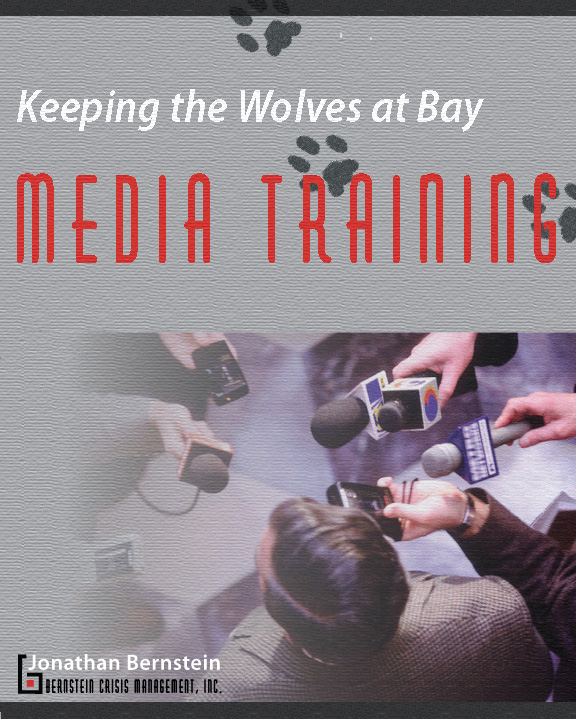JUST A THOUGHT
Any crisis communications or other crisis management-related plan written more than two years ago and not updated since has gaping holes in it as a result of changes in social media.
|
|
|
FROM THE EDITOR
As stated in the "Just a Thought" I offered you, above, social media mandates -- I repeat, mandates -- that changes be made to any crisis planning document which doesn't accommodate the realities of social media in the year 2010.
Ideally, of course, such plans are updated at least twice yearly anyway, but in reality that seldom happens.
In this issue, blogger and consultant Mike Johannson does a great job of getting you started on the road to improving those plans with his PR Crisis Management in the 'Twitter Age' article.
Then, we segue to a subject near and dear to my heart, talking to the media in litigation-related situations and, in particular, what lawyers should know about this topic, and The Need for Lawyers to Learn the Ground Rules of Talking to Reporters. Give it to your general counsel or outside attorney. It's not a subject taught in law school. And, although the article addresses lawyers, it has lessons for all spokespersons. My thanks to the authors and their firm, McDermott, Will & Emery, for permission to use this piece that appeared on their blog.
Changing topics, if you happen to be a senior-level HR person, legal industry giant Steptoe & Johnson are holding their 7th Annual Labor Relations Conference in May, and it will include a crisis management-related presentation by your editor. All attendees will receive a complimentary copy of my new Keeping the Wolves at Bay - Media Training.
If you are eager for crisis management-related news in between issues, do visit our blog, which is fed stories five times a week by our "blog team," my son Erik and I. Erik is also making some of my clients very happy with his social media program implementation on their behalf.
As always, if you like what you see, please share it with others by using the "Forward Email" link at the bottom of the ezine and tell them to subscribe! IMPORTANT NOTE: I just learned from Constant Contact that if you just "Forward" using your own email program's "Forward" function and your recipient thinks they're being spammed, they can click on the Opt Out link and opt YOU off the list. So use the "Forward Email" link, please.

My best to all, Jonathan
|
PR CRISIS MANAGEMENT
IN THE 'TWITTER
AGE'
By Mike Johannson
"In the Twitter age" is a term I heard this past week froMike Johannson
 | m a slightly
frustrated public relations professional talking about how he's been
forced to
modify his crisis management plan.
And change he must. The best-laid crisis management plan will quickly
unravel
when information - true, untrue or even malicious - starts spreading on
platforms such as Twitter and Facebook.
So how do PR professionals get from "being there"
in social media to modifying their crisis management plan in the
"Twitter age"?
Engagement: More than ever it's
important that solid social
relationships are being built before a crisis breaks. Doing the
basics on social platforms is a start; being fully engaged with
social audiences will help save your reputation at a time of crisis.
Resources: If you don't have
someone on social media fulltime then you
need to have them on it most of the time. Look at how your organization
currently spends time. How much effort is still going into maintaining
relationships with a few traditional media types? The ratio of time
devoted to
traditional media vs. social media needs to be flipped ... even if
slowly at
first.
Listening: From basic free tools
such as Google Alerts to paid services such as Alterian's SM2 or
Radian6 you can't afford to NOT be
monitoring conversations in social media around your products, your
organization and your key people. You don't know what you're missing -
literally. And that should be a very frightening prospect.
Black pages: If your news web
pages don't have "black pages" (pages
designed to go live in response to various issues) you need to prepare
them
now. Every organization can predict certain types of issues that are
likely to
arise. Having a landing page that answers some likely first questions
and that
can go up on your website at a moment's notice is smart planning.
First responders: You've already assigned responsibilities during
a
crisis, but whose job is it to manage social media messages and to
respond to
any inaccurate messaging? What is on that person's checklist? Not
responding is
no longer an option ... if it ever was. In the social world silence can
equal
acknowledgement that things are bad. Your social media first responder
needs to
understand this and the critical role they are playing in social
messaging.
Prioritizing: Which social media
platforms need the most attention?
Without a doubt Twitter is an instant news service and deserves the most
attention. Don't be fooled by the numbers of Twitter users in your
organization, your industry or your community. Twitter users are some of
the
most-educated, most-active and, possibly worst for you in a crisis,
most-likely
to spread what they see on Twitter via word-of-mouth. In other words
their
broad influence should be of great concern. Facebook is also a default
communication platform by people who are concerned. Be sure to message
there
too and note that once the heat of the moment dies down the conversation
around
the crisis will likely linger longer on Facebook.
Follow-up: Once the crisis has
passed don't ignore social media. Find a
way to post a reassuring video message from the CEO on YouTube or have
someone
in authority blog about the event and its successful outcome ... load it
up with
photographs. Be sure to reach out to those who were most active during
the
crisis to alert them to this follow-up.
Can PR professionals control messaging on social media platforms during a
crisis? No. But they can be there, be engaged and can quickly tamp down
the
small sparks of inaccuracy before they become damaging firestorms of bad
information. Social media is changing the PR professionals' job
description,
what else about crisis management did I leave out?
Mike Johannson is a Social Media
Strategist at Fixitology and Visiting Professor in PR and Journalism at
Rochester Institute of Technology. More information at the For Free Blog or SocialMediaToday. |
|
THE NEED FOR LAWYERS TO LEARN THE GROUND RULES OF TALKING TO REPORTERS
By Lanny Davis & Eileen O'Connor
Lawyers can get better access to all the facts and documentary evidence
than non-lawyers because they enjoy the protection of the attorney-client
privilege-i.e., they cannot be compelled to testify concerning their
legal advice to their clients, or the knowledge they obtain in the course of
being able to provide such advice, or the documents they review in determining
those facts.
By contrast, non-lawyer advisors, even those public relations firms
retained by law firms to assist in litigation, do not share this
protection: their documents may be subject to a "qualified" privilege, but
there may be occasions when, notwithstanding that privilege, they will be
forced to disclose to the opposition their written advice and strategic
documents provided to lawyers that have hired them. And in any event, they
will almost never be given the protection of the attorney-client privilege to
avoid testifying to conversations to which they have been privy because, as
non-lawyers, they cannot claim to be rendering legal advice. Indeed, if
they are present while lawyers are providing such advice to clients, they may
actually create a waiver of the privilege, leading to the horrifying
possibility that even the lawyers and clients may be forced to testify as to
what was discussed.
Thus, lawyers need to learn how to talk to the media directly. They
have access to the facts and for that reason are more credible in the eyes of
many reporters. They also know the legal issues and risks involved in the
litigation and won't be as likely to make an error that could lead to a
damaging public comment that prejudices the case. And most importantly,
they can work with the client and other lawyers to develop a believable
message, based on the facts, that can drive and command the message in the
media, correct factual distortions pushed out by the other side and avoid poisoning
of the jury pool.
But in order to be most effective, lawyers enjoying the benefit of the
privilege must learn the basic ground rules for talking to the
press. This will be a first in a series of blog posts explaining both the
ground rules as well as the special vocabulary and techniques for being most
effective in talking to reporters.
For now, let's start with four voices that can be chosen and, once
chosen, must be agreed to ahead of time by a reporter and/or his or her editor.
First, "on the record" means speaking with attribution, a name and
identification as the lawyer in the case.
Second, "on background" must be defined ahead of time, since many
people, reporters and non-reporters alike, mean different things by this
expression. The best definition should be "on background-by this I mean
you can use my quotation, but identify me only as a 'spokesperson' or 'lawyer
for' and don't mention my name."
This is often confused with the third expression, "deep background,"
which is why both the second and third must be defined and agreed upon by the
lawyer and the reporter before proceeding. "Deep background" means "you
can use my facts as long as you do not attribute them to me, or if you have to
use any attribution, then you can use something anonymous like a 'knowledgeable
source' or 'source familiar with the situation.' Or you can use the fact
without any attribution at all and confirm the fact with others."
Finally, there is "off the record." Many people use that expression
to mean "on background" or "on deep background." It is highly recommended
that "off the record" be followed by this statement: "You must agree that
you cannot use what I say at all unless I change the ground rules and allow you
to. You cannot mention the substance of what I say to anyone or that I am
saying it. I am telling you this only for your own understanding and for
no other purpose."
In other words, don't use "off the record" if you can avoid it. And
if you must, use it only to explain a complicated problem that you don't want
to see in print at that moment in time.
On the other hand, we advise that even if you decide to use "off the
record" and fully trust the reporter or editor who agrees to that ground rule,
always be careful since many reporters, even in good faith, might unconsciously
repeat the information and not even realize they are violating the ground
rule. Thus, we always assume that even an "off the record" comment might
be repeated or used, so we never use this expression to communicate something
that is not a fact that can be documented and proven.
In subsequent postings, we will offer examples of the use-and misuse-of
these different voices, as well as vocabulary that should be used and
communication techniques that work best with reporters.
This article originally appeared on, and was printed by permission of, McDermott, Will and Emery's
originally appeared on, and was printed by permission of, McDermott, Will and Emery's
Legal Crisis Strategies blog. |
|
BUSINESS ANNOUNCEMENTS
(aka blatant self-promotion)
Keeping the Wolves at Bay: Media Training
What has 80+ pages of hard-hitting, entertaining and easy-to-read guidance on how to deal with both traditional and online media during times of crisis? The answer is
Keeping the Wolves at Bay - Media Training. The, four-color, perfect-bound, 8x10 manual is currently available both in hardcopy ($25) and PDF form ($10). Volume discounts are available; write to Jonathan Bernstein for that information.
Here's a couple of teaser reviews for you:
Jonathan Bernstein's Keeping the Wolves at Bay is an eminently practical guidance for anyone - business leader, celebrity, politician - who must willingly or unwillingly face the glare of media attention. It appears
at a moment in time when the social media and other digital communications have upped the ante exponentially.
Bernstein's practicum on media relations takes on renewed urgency as news, gossip, and opinion now drive
public perception virally and at the speed of light.
Richard Levick, Esq.
President & CEO
Levick Strategic Communications, LLC
Even if you think
you'll never, ever be interviewed by the media, buy this book and read it cover
to cover. It isn't a substitute for media training. But it will give you the
tools and confidence to go head to head -- and possibly even defang -- rabid reporters,
blood-thirsty bloggers and social networking buffoons who are out to besmirch
your good name. Joan Stewart, The Publicity Hound
The book and other products can be found at the
Crisis Manager Bookstore
Want To Blog
And Tweet About
Your Organization But Don't Have Time?
Missing out on all the promotional and SEO
advantages of doing so? Hire someone to be your voice...like Erik Bernstein,
aka "Son of Crisis Manager."
More info:[email protected].
|
GUEST AUTHORS
GUEST AUTHORS are very welcome
to submit material for "Crisis Manager." There is no fee paid, but most
guest authors have reported receiving business inquiries as a result of
appearing in this publication. Case histories, experience-based
lessons, commentary on current news events and editorial opinion are
all eligible for consideration. Submission is not a guarantee of
acceptance.
|
ABOUT THE EDITOR & PUBLISHER
Jonat han Bernstein is president of Bernstein Crisis Management, Inc., a national crisis management public relations agency providing 24/7
access to crisis response professionals. The agency engages in the full
spectrum of crisis management services: crisis prevention, response,
planning & training. He has been in the public relations field
since 1982, following five-year stints in both military intelligence
and investigative reporting. Write to [email protected]. han Bernstein is president of Bernstein Crisis Management, Inc., a national crisis management public relations agency providing 24/7
access to crisis response professionals. The agency engages in the full
spectrum of crisis management services: crisis prevention, response,
planning & training. He has been in the public relations field
since 1982, following five-year stints in both military intelligence
and investigative reporting. Write to [email protected].
|
|
LEGAL
DISCLAIMER
All
information contained herein is obtained by Jonathan Bernstein from sources
believed by Jonathan Bernstein to be accurate and reliable.
Because of
the possibility of human and mechanical error as well as other factors, neither
Jonathan Bernstein nor Bernstein Crisis Management is responsible for any
errors or omissions. All information is provided "as is" without
warranty of any kind. Bernstein Crisis Management and Jonathan Bernstein make
no representations and disclaim all express, implied, and statutory warranties
of any kind to the user and/or any third party including, without limitation,
warranties as to accuracy, timeliness, completeness, merchantability, or
fitness for any particular purpose.
Unless due
to willful tortuous misconduct or gross negligence, Jonathan Bernstein and
Bernstein Crisis Management shall have no liability in tort, contract, or
otherwise (and as permitted by law, product liability), to the user and/or any
third party.
Under no
circumstance shall Bernstein Crisis Management or Jonathan Bernstein be liable
to the user and/or any third party for any lost profits or lost opportunity,
indirect, special, consequential, incidental, or punitive damages whatsoever,
even if Bernstein Crisis Management or Jonathan Bernstein has been advised of
the possibility of such damages.
A service
of this newsletter is to provide news summaries and/or snippets to readers. In
such instances articles and/or snippets will be reprinted as they are received
from the originating party or as they are displayed on the originating website
or in the original article. As we do not write the news, we merely point
readers to it, under no circumstance shall Bernstein Crisis Management or
Jonathan Bernstein be liable to the user and/or any third party for any lost
profits or lost opportunity, indirect, special, consequential, incidental, or
punitive damages whatsoever due to the distribution of said news articles or
snippets that lead readers to a full article on a news service's website, even
if Bernstein Crisis Management or Jonathan Bernstein has been advised of the
possibility of such damages. Authors of the original news story and their
publications shall be exclusively held liable. Any corrections to news stories
are not mandatory and shall be printed at the discretion of the list moderator
after evaluation on a case-by-case basis.
|
|
|
|